Of the many triumphs of feminism, and often-cited benefit of women’s equality is the goal of equal participation in the job market. We are able to benefit far more than previous generations from women’s job skills being taken seriously, and there are more working mothers than ever before. And yet maternity leaves, like real wages, or salaries for women of color, or job security for laboring women who are also about to be in labor, remain far behind the glowing promises of the 1970s (or the 1920s, if you go with Soviet promises).
Despite the wide variety in length of leaves available across the world, from the average three months of the United States to the year-long leaves granted to British mothers, crime writers on maternity leave all seem to agree that this is the perfect (and perhaps only) time available to them to craft a psychological thriller. The late nights, the sudden isolation, the shocking reduction from intellectual other to gendered body, the alienation of the nuclear family, the harsh nature of societal judgements upon new mothers—all seem to conspire to make new mothers feel doubted, silenced, and full of plot ideas for thrillers. Perhaps there’s nothing more noir than being subsumed to the all-encompassing needs of a tiny alien that, had evolution taken a different track, might have found its way to the surface by cannibalizing the flesh of its mother (hey, it happens!). And then, of course, there’s the sneaking tendrils of post-partum depression making its own way into the mix…
I am not a mother, nor am I particularly interested in ever becoming one. I am, however, fascinated by those moments in which those of us who’d like to believe we’ve graduated beyond gender are harshly reminded of gender’s bodily demands.
I’m also writing this post in tribute to several colleagues who spent time on maternity leave this past year (congratulations, all!).
The following works were begun, polished, imagined, or perfected during the short window allotted to their authors to bond with their newborns. While some are about the stresses of new parenthood, others have nothing to do with child-rearing. And given the number of illustrious careers first begun as cramped notes and stolen moments, I wonder how many more novels might be born from such experiences, were they to last just a little bit longer.
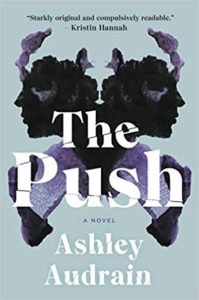
The Push, Ashley Audrain
Ashley Audrain’s terrifying novel The Push concerns a young mother whose own insecurities about parenting bleed into her growing knowledge of her child’s psychopathy, in what feels like a way more thrilling version of We Need to Talk About Kevin. The mother of Audrain’s debut is sleep-deprived, traumatized, and belittled and ignored by her partner, yet still she knows that something is fundamentally, desperately wrong with her child. Ashley Audrain works in publicity for Penguin Books Canada, and started writing The Push while on her own maternity leave.
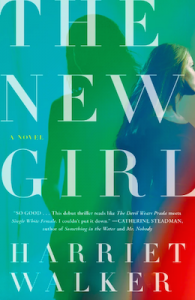
The New Girl, Harriet Walker
Harriet Walker, who wrote her debut The New Girl while on maternity leave, found quarantine eerily familiar. In The New Girl, a woman on maternity from a fashion magazine is sent into a tailspin of doubt and dismay after her best friend’s newborn dies soon after birth. Someone keeps sending her images of the dead child, and someone’s been systematically dismantling her reputation online as the temp hired to cover for her seems to be getting a little too good at the job. The New Girl exists in a complex space between rivalry and solidarity, as characters grapple with impulses to take each other down even as they grudgingly move towards mutual assistance. Harriet Walker writes that:
“As the world shut down, any woman who has been on maternity leave with a newborn will have felt the memory of confinement shiver through them like a déjà vu: the smothering closeness, after a while, of one’s own home and company. And any reader or writer of thrillers knows the power of isolation too: there is nothing quite like too much time by yourself to set in motion the wheels of doubt, intrigue and potential destruction.”
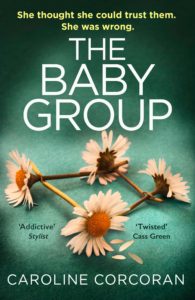
The Baby Group, Caroline Corcoran
Caroline Corceran’s The Baby Group (published in the UK last year) features a group of new mothers brought together by their condition, and torn apart by their dark secrets. In an interview, Corceran explains her inspiration for the novel, begun while the author was on maternity leave: “I kept thinking about how maternity leave means you spend all this time together with other expectant mums while barely knowing anything about each other as women, as people, only as mothers.” A potent set-up for secrets to lurk, and relationships to fester…
Check out Caroline Corcaran’s article on the rise of “mum noir.”
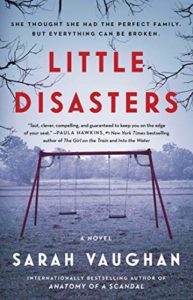
Little Disasters, Sarah Vaughan
While Sarah Vaughan didn’t write her novel Little Disasters until several years after her maternity leave, the inspiration for this tale of post-partum anxiety is most definitely rooted in the early days of parenting. Vaughan writes:
[T]his mother’s visceral sense of helplessness was inspired by my own experience with my firstborn, a baby who was gripped with colic from three to sixteen weeks and who seemed to scream with inexhaustible fury. As a 32-year-old, who, bar a failed driving test and some infertility treatment, had largely succeeded at things, I found this baffling, shaming, and terrifying. Of course, the colic stopped, and by about 18 months, my baby slept. But the sense of profound incompetence—why couldn’t I get her to sleep? Why did she hate me so much?—and the speed with which my sense of self started to unravel stayed with me a lot longer. In those days, I was a news reporter, not a novelist, but perhaps even then I was aware that the situation was rich with narrative potential.
Read an article by Sarah Vaughan exploring motherhood as a fertile subject for crime fiction.
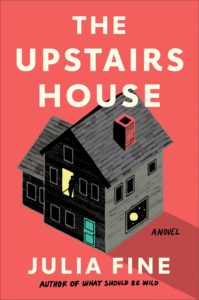
The Upstairs House, Julia Fine
Julia Fine’s worn-out narrator is on indefinite maternity leave, stressing over her newborn and trying to finish her dissertation, when she finds her way to the ghost of Margaret Wise Brown through a mysterious door upstairs in her apartment building. Both a gothic tale of madwomen in the attic, and an erudite digression on mid-century American children’s literature, The Upstairs House is as fascinating to read as it is hard to describe, and an intriguing exploration of the boundaries between physical and intellectual creations.

Need To Know, Karen Cleveland
Karen Cleveland wrote her debut espionage novel while on maternity leave from her very fascinating day job as a CIA analyst specializing first in Russia and later in counterterrorism. Both her background and her children make their way into Need to Know, an informed and subtle page-turner perfect for fans of The Americans.
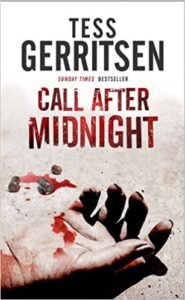
Call After Midnight, Tess Gerritsen
Tess Gerritsen was on maternity leave from her job as a doctor in Hawaii (#goals) when she penned her first intricate thriller, Call After Midnight, in which a newlywed, refusing to believe her husband has been killed in a fire, goes on a dramatic search for him across Europe and encounters dangerous forces along the way. Gerritsen now writes full-time and incorporates her medical knowledge into some of the most fiendishly clever medical thrillers ever plotted.

People Like Her, Ellery Lloyd
Husband-and-wife writing duo Paul and Collette, who publish under the pen name Ellery Lloyd, were inspired to write this grand guignol tale of influencing gone awry during Collette’s maternity leave, a fact that makes the twists and turns of this shocking thriller all the more delightful. An instamum influencer and her novelist husband can’t quite agree on how much of their privacy each is willing to give up in the search for more followers, and the appearance of a stalker quickly takes things from bad, to worse, to utterly nightmarish, as the characters of People Like Her vent legitimate frustrations in extremely unhealthy ways for a fascinating social commentary on a new era of fame.
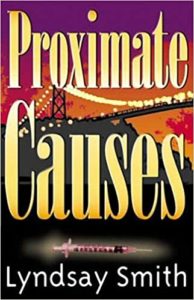
Proximate Causes, Lyndsay Smith
Lyndsay Smith was on maternity leave from her job as a lawyer in Vancouver specializing in organized crime when she began her first novel, Proximate Causes. She told ABC Book World that “The moment he napped, I started mapping it out. I had no idea how it would end, I just loved the process of writing. Then I had a second child. The first draft took me two-and-a-half years. That was the easy part.”
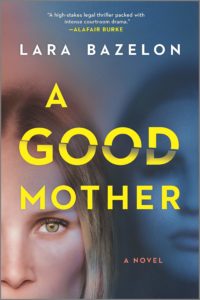
A Good Mother, Laura Balezon
In this shocking debut legal thriller, coming out this May, a public defender recently returned from maternity leave is tasked with defending a woman accused of killing her husband. Was it self-defense, or cold-blooded murder? Balezon explores the complexities of returning to work after giving birth—her heroine feels both guilty and eager to head back to the job— and in portraying a case involving a mother who may be separated from her daughter by a long prison sentence, expands her narrative to contemplate the meaning of motherhood and separation from a wider lens. Balezon worked on the novel while on her own maternity leave.

















